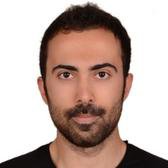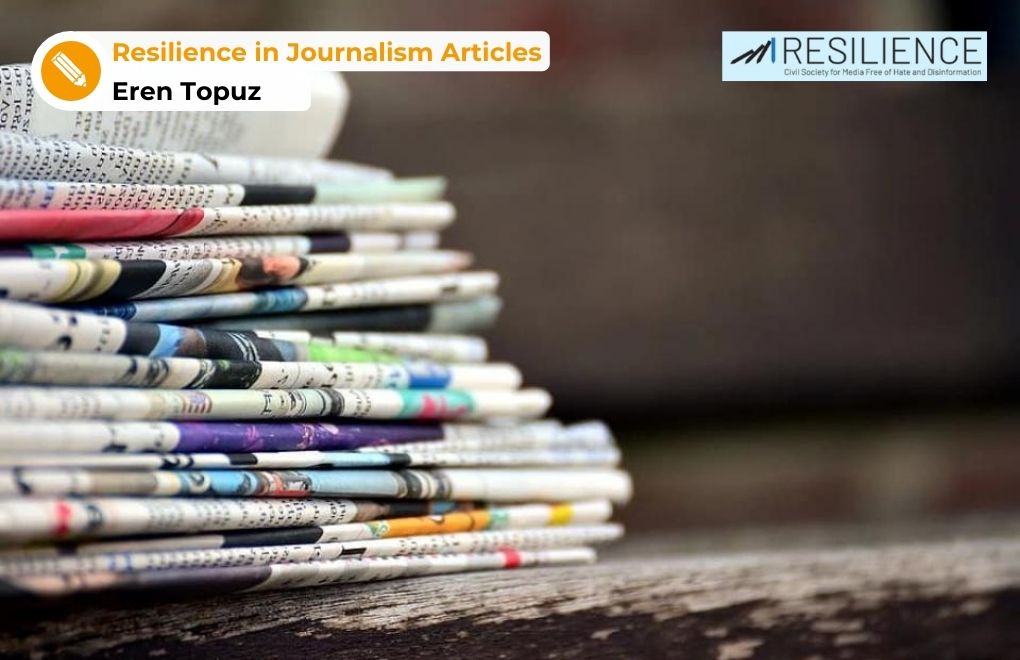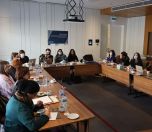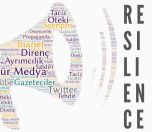Click to read the article in Turkish
This article has been published as part of the "Resilience in Journalism" article series which sets out to offer critical reviews exemplifying hate speech and disinformation in the media as part of the Resilience Project, of which the IPS Communication Foundation / bianet from Turkey is one of the partners. |
In the multicultural social structure of Turkey, almost every group which is visible in the public sphere and becomes the subject of debate has been subjected to insults, humiliation and targeting remarks.
The only reason behind this "hate speech" containing content cannot be solely the lowbrow language of the media in Turkey.
CLICK - 'Resilience in Journalism' article series begins
If we start from the premise that "everything is class-based", the media cannot be the source of hate speech, but can only be the sphere where it becomes visible. The source of hate is directly related to who holds the political power as well as who has the media tools.
Media-capital-politics
The relation among the media, capital and politics is a matter of debate not only in Turkey but in every country governed by "democracy". The studies in this field frequently emphasize that in democracies, the media is called the "Fourth Estate" after the legislative, executive and judicial powers. It is also generally accepted that dominant powers want to have the authority to keep media tools under their control in order to be able to lead the public.
In Turkey, depending on the conjuncture, political power holders, the group at the center of the debate and the owners of media outlets change but the relation among these three variables does not.
Depending on the group that the current debate is concerned with, sometimes refugees and foreigners, sometimes LGBTI+ citizens and religious and ethnic minorities of this country, sometimes political movements are subjected to hate speech in the media. In fact, at times when the debates within a class are out in public, the businesspeople and politicians with less political power get their share from the hate that they lend support to.
Ownership in the media
As much as the past 20 years of Justice and Development Party (AKP) rule offer bothersome examples of hate speech with the "ownership" wars in the media and the climate caused by social polarization, the media-capital-politics relation has an older history in Turkey.
In this history, the 80s and 90s, when media outlets with high circulation figures changed hands, new capital holders entered the media sector and conglomeration came to the fore, also have a special place.
CLICK - Media Ownership Monitor (MOM)
For instance, Aydın Doğan, who entered the media sector by purchasing daily Milliyet from the Karacan Family in 1979, also bought daily Hürriyet, which was founded by the Simavi Family, in 1994, thereby owning two media outlets described as mainstream media, drawing most of the advertisements and having the largest audience and sphere of influence in the country.
The case of Aydın Doğan
Having conglomerated in 1980, the Doğan took steps of horizontal monopolization by coming to own newspapers such as Radikal, Posta and Fanatik in addition to Milliyet and Hürriyet. Operating in different fields of the media sector such as TV, radio, magazine, news agency and distribution company, it also exemplified vertical monopolization.
Aydın Doğan's motivation in entering the media sector was undoubtedly not the same as that of Sedat Simavi, who founded Hürriyet in 1948, or that of Ali Naci Karacan, who founded Milliyet in 1950. Both Sedat Simavi and Ali Naci Karacan had been within the profession since their 20s. As for Aydın Doğan, he had already entered the sector as a tax champion businessperson.
Within the body of Doğan Holding, there were companies operating in sectors that could be much more lucrative than the media such as banking, tourism, textile and energy. We know from its steps of monopolization and its attitude towards its employees' efforts of unionization that it did not enter the media sector to incur a loss. Besides, being the most powerful one in the Fourth Estate had some returns other than financial profits.
Thanks to the prestige stemming from holding the media power and privileges stemming from relations with politicians and bureaucrats, several capital owners who enter the sector can achieve various returns such as having an advantageous position in public tenders, making an easier use of public banks' loans and tax deductions, marketing the investments in other sectors and even standing in the way of their competitors' advertisements.
All this network of relations, which is an extension of media outlets being within the body of holdings, brings about the owners' interference with the content. For instance, it goes against the grain that the newspaper of a media boss preparing to bid in a public tender reports on corruption in the related public institution which announces the tender.
Moreover, at the media outlets within the body of holdings, there emerges a publication policy close to the ideology of the currently dominant political power, which destroys the allegation of being an "independent" media outlet and leads the hate speech towards the group portrayed as an enemy by the articulated political power to be visible in the media.
'Hate' for Ahmet Kaya
For instance, in the period when Ertuğrul Özkök, who has recently parted ways with Hürriyet, was the editor-in-chief, the newspaper addressed Ahmet Kaya with the headline "You ignoble" (Vay şerefsiz) after he was put on trial at the-then State Security Court and went abroad following his announcement that he would record a Kurdish song in his next album or it called South African leader Nelson Mandela "Ugly African" (Çirkin Afrikalı) for not accepting the International Atatürk Peace Prize [named after the founder of the Republic of Turkey], which were not independent of the relation between the political power holders of the time and Aydın Doğan.
The Uzan group
Going viral on social media with the videos that he shares from abroad these days, Cem Uzan was also one of the capital owners who entered the media sector by attempting to establish the first private TV channel in Turkey in the same period. Like the Doğan Holding, the Uzan Group was also operating in different sectors with the companies such as İmar Bank, Kepez Electricity and Telsim within its body. In fact, unlike Aydın Doğan, Cem Uzan also entered politics with his power in the media. Achieving a significant rate of votes with 7 percent in the 2002 general elections, when the AKP came to power, Uzan could not pass the 10-percent electoral threshold but he still managed to affect the distribution of seats at the Parliament.
The Uzan Group was winning public tenders on the one hand and operating in different fields of the media sector such as TV and radio broadcasting and newspaper publication on the other.
In the period of February 28 [post-modern coup in 1997], Star newspaper, which once had the highest circulation figures in Turkey, used a picture of Salih Mirzabeyoğlu, who was given a life sentence for allegedly leading the Great Eastern Islamic Raiders' Front (İBDA-C), with his face covered with cuts and put the headline "He cut his face while having a shave" (Tıraş olurken yüzünü kesti) or referred to two English citizens who died in the incidents that erupted before the UEFA Cup Semi-Final between Turkey's Galatasaray and England's Leeds United by putting the headline "Two size" after the match, which cannot be considered independently of the relation of the Uzan Family with the political power holders of the time.
The ones close to the AKP in the media
The AKP won the 2002 general elections and came to power, which also had some repercussions in the media sector. The Uzan Group and Doğan Group, which had entered the sector before 2002, left the media sector in the AKP era. The Çukurova, Ciner and Doğuş groups, which had entered the sector in the 90s, have been the capital groups that have managed to keep operating in the media sector after 2002. New capital groups such as Kalyon and Demirören entered the media sector in this period.
The İmar Bank, which was owned by the Uzan Family, was seized in 2003. A year later, 219 companies owned by the family were transferred to the Saving Deposit Insurance Fund (TMSF). In 2009, the Doğan Holding was barred from all public tenders. In the same year, the Doğan Media was given a tax penalty of almost 6.5 billion lira. Leaving his war with the new political power holders of the new era defeated, Aydın Doğan left the media sector by selling the Doğan Media to the Demirören for 916 million US dollars in 2018.
Even though the ownership of the media tools has changed hands, the relation among the media, capital and politics has not changed in this period, either. On the contrary, a univocal media sector has emerged in Turkey since the end of the 2010s, when the political power was concentrated in one hand. The relations between the capital groups that own the media tools and the government have remained in place in the form of public tenders, loans received from public banks, debt restructuring and tax deductions, as was also the case in the previous periods.
Single politics, single voice
The Kalyon Group, incorporating the Turkuvaz Media, which consists of media outlets such as ATV, Sabah, Fotomaç, also wins public tenders and engages in activities of construction such as the 3rd İstanbul Airport, metrobus line, stadiums, thermal plants, pipelines and public hospitals.
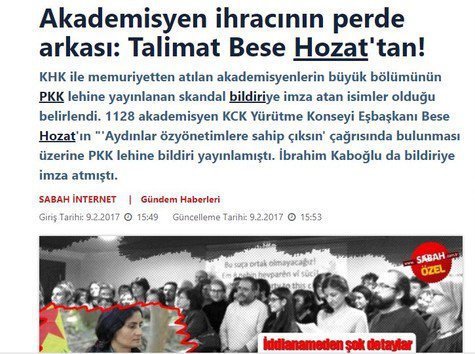
Sabah newspaper, which is owned by this capital group, targeted the 1,128 Academics for Peace, who were discharged from the academia by a Statutory Decree for having signed the declaration "We will not be a party to this crime", with its news report titled "Behind the scenes of discharge from academia: Instruction from Bese Hozat [of the Kurdistan Communities Union - KCK]" on February 9, 2017, which was a natural product of the projects carried out by the Kalyon Group outside the media sector and its relations with the political power holders.
Having purchased the Doğan Media, incorporating a series of media outlets such as Hürriyet and Milliyet newspapers, Kanal D and CNN Türk channels and Doğan News Agency (DHA), the Demirören is still on the agenda today as it has not paid back its 750-million-dollar loan debt to Ziraat Bank and is trying to have its debt of almost 2 billion dollars restructured.
Now owned by the Demirören Group, Hürriyet newspaper put some headlines associating Syrian refugees with crime such as "The Syrian tension in İzmir", "The father-son who warned noisy Syrians stabbed", "Intervention with tear gas against Syrian tension in Şanlıurfa", "Syrians' stampede for aid in Gaziantep" and "A march in protest against Syrians in Kayseri". Amid escalating tension due to the drilling activities off the coast of Cyprus, the same newspaper reported some news with the headlines "The Cypriot Greek-Greek duo knocked over the table again" and "Impertinent statement by Greek minister again". Daily Milliyet, owned by the same group, also published a news story titled "Armenians massacred 500 thousand Muslims". The production of content targeting more than one ethnic group through different incidents can be cited as significant examples to understand under what circumstances hate language is formed.
Albayrak group
The Albayrak Group, which incorporates Yeni Şafak newspaper, one of the first media outlets that come to mind when one talks about hate speech in news, also runs large-scale construction projects such as subways, docks and hospitals by winning public tenders.
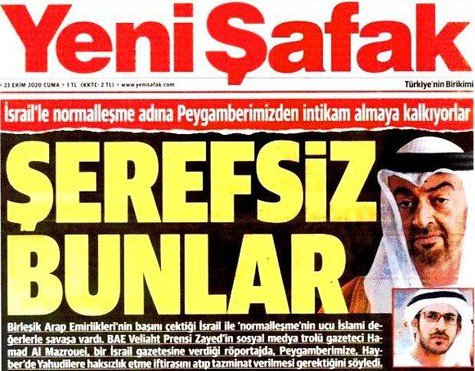
Some of the first examples of Yeni Şafak's hate speech that come to mind are the headline of "They are ignoble" (Şerefsiz bunlar), which referred to United Arab Emirates' (UAE) Crown Prince Mohamed bin Zayed, who has recently been welcomed in Turkey's capital city of Ankara with a ceremony, on October 23, 2020; the headline of "There are more terrorists than students" (Öğrenciden çok terörist var) dated February 3, 2021, which targeted the students of Boğaziçi University who protested the trustee-rector; and the headline of "Qandil's barons" (Kandil'in baronları), which referred to the bar associations of 15 provinces that released a joint statement in the face of the recent attacks on Kurdish families in Ankara, Afyon and Konya provinces.
The parallel between the groups subjected to hate speech in the media and the groups in conflict with the political powers of the time is clearly seen. On the other hand, we can say that the polarization in the social structure and capital reproduces itself in the media in the same way. Today, the media outlets that are not necessarily secretly close to the opposition parties have also obtained a strong position in the media sector, which has led to hate speech against some sections of society at the related media outlets due to the reactance to the government's policies.
For instance, while a discriminatory language is encountered in the pro-government media outlets' third page news about judicial cases involving refugees, whom the government has turned into a leverage in its relations with the European Union (EU), there have emerged such hate narratives in the "opposition" press which criticizes the migration policy of the government that it directly targets refugees' ethnic identities and existence in Turkey in a higher tone. This situation, which we can consider to be hate breeding hate, also needs scrutiny in its own right.
To sum up, hate speech was present in the media before the AKP rule and before polarization became so harsh. However, be that in the media groups articulated to the government, the ones acting closely to the opposition parties or the "independent" media outlets doing online journalism, hate speech must not be considered a normal phenomenon or a result emerging by nature of the profession. On the contrary, there needs to be a struggle against the process which causes hate speech to emerge in the first place.
Both the government, hate speech may change
Called the Fourth Estate today due to its sphere of influence and its supervisory role in democracies, the media's "independence" is apparently crushed under the phenomenon of ownership. The election is upon us. The change of government, which is loudly uttered these days, has now turned into a reality involving preparation for what comes next rather than being solely a wish. Just like September 12 [military coup in 1980] and the 2002 election, this awaited change of government will also have repercussions in the media sector.
It has recently been reported in the news that Aydın Doğan will allegedly come back to the media sector following the change of government, which gives us hints about the transformation awaiting the media in Turkey, regardless of whether there is truth to these allegations or not.
It is not hard to predict that several capital groups which finance their companies in the media sector with the public tenders that they win in the construction sector will come to the brink of bankruptcy and will have to sell off their media outlets in the event of a possible change of government. It is not realistic to expect a change of government that will eliminate the phenomenon of media ownership. For this reason, it seems to be imperative for everyone to wage a struggle to ensure that the chain between the new political power holders and the media, capital and politics is broken and the climate that brings hate speech into being is eliminated.
About the Resilience project
Funded by the European Union The regional program 'RESILIENCE: Civil society action to reaffirm media freedom and counter disinformation and hateful propaganda in Western Balkans and Turkey' is implemented with the financial support of the European Union by partner organizations SEENPM, Albanian Media Institute, Mediacentar Sarajevo, Kosovo 2.0, Montenegrin Media Institute, Macedonian Institute for Media, Novi Sad School of Journalism, Peace Institute and bianet. This article was produced with the financial support of the European Union. Its contents are the sole responsibility of bianet and do not necessarily reflect the views of the European Union. You can have detailed information about the project here. Click here for the first report. Click here for the second report. Click here for the factsheet on Turkey |
Resilience in Journalism Articles
Where does hate speech stand, where does freedom of expression? / Nazan Özcan
The hate of the Fourth Estate / Eren Topuz
Media's hate for the colors of the rainbow / Selay Dalaklı
Media in Kurdish threatened with extinction in Turkey / Murat Bayram
(ET/NÖ/SD)




